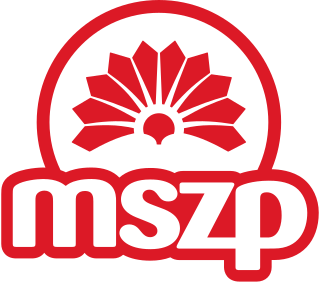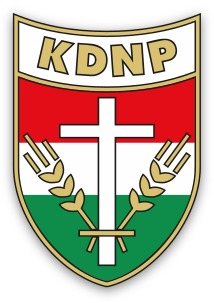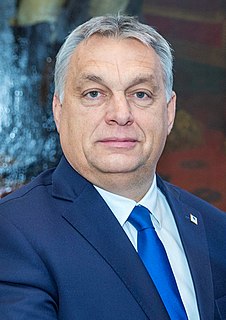See also
- Opposition (politics)
- United for Hungary, previously known as United Opposition
United Opposition may refer to:
Opposition may refer to:
Parliamentary opposition is a form of political opposition to a designated government, particularly in a Westminster-based parliamentary system. This article uses the term government as it is used in Parliamentary systems, i.e. meaning the administration or the cabinet rather than the state. The title of "Official Opposition" usually goes to the largest of the parties sitting in opposition with its leader being given the title "Leader of the Opposition".
Open Society Foundations (OSF), formerly the Open Society Institute, is a grantmaking network founded and chaired by business magnate George Soros. Open Society Foundations financially supports civil society groups around the world, with a stated aim of advancing justice, education, public health and independent media. The group's name is inspired by Karl Popper's 1945 book The Open Society and Its Enemies.

The Hungarian Socialist Party, commonly known by its acronym MSZP, is a centre-left social-democratic and pro-European political party in Hungary.

Fidesz – Hungarian Civic Alliance is a right-wing populist and national-conservative political party in Hungary, led by Viktor Orbán.
MLP may refer to:

Viktor Mihály Orbán is a Hungarian politician who has served as prime minister of Hungary since 2010, previously holding the office from 1998 to 2002. He has presided over Fidesz, since 1993, with a brief break between 2000 and 2003.

The Democratic Coalition is a social-liberal political party in Hungary led by former Prime Minister Ferenc Gyurcsány. Founded in 2010 as a faction within the Hungarian Socialist Party (MSZP), the Democratic Coalition split from the MSZP on 22 October 2011 and became a separate party. It has nine MPs in the National Assembly and four MEPs in the European Parliament.

Ferenc Gyurcsány is a Hungarian entrepreneur and politician who served as Prime Minister of Hungary from 2004 to 2009. Prior to that, he held the position of Minister of Youth Affairs and Sports between 2003 and 2004.

The Christian Democratic People's Party is a right-wing Christian democratic political party in Hungary. It is officially a coalition partner of the ruling party, Fidesz, but is mostly considered a satellite party of Fidesz, and has been unable to get into the Parliament on its own since 1998. For several elections prior to the pact, they had been unable to pass the election threshold of 5% of the vote. Without Fidesz, its support cannot be measured, and even a leading Fidesz politician, János Lázár, stated that Fidesz does not consider the government to be a coalition government.

Albert György Gyula Mária Apponyi, Count of Nagyappony was a Hungarian aristocrat and politician. He was a Board Member of the Hungarian Academy of Sciences, Chairman of St Stephen Academy from 1921 to 1933, and a knight of the Austrian Golden Fleece from 1921.

The Movement for a Better Hungary, commonly known as Jobbik, is a conservative political party in Hungary.

The Hungarian People's Republic was a one-party socialist state from 20 August 1949 to 23 October 1989. It was governed by the Hungarian Socialist Workers' Party, which was under the influence of the Soviet Union. Pursuant to the 1944 Moscow Conference, Winston Churchill and Joseph Stalin had agreed that after the war Hungary was to be included in the Soviet sphere of influence. The HPR remained in existence until 1989, when opposition forces brought the end of communism in Hungary.
In politics, a political alliance, also known as a coalition or bloc, is cooperation by members of different political parties on a common agenda of some kind. This usually involves formal agreements between two or more entire parties. An alliance is usually especially beneficial to the parties concerned during and immediately after elections – due to characteristics of the electoral systems concerned and/or allowing parties to participate in formation of a government after elections. These may break up quickly, or hold together for decades becoming the de facto norm, operating almost as a single unit. Alliances may also form prior to elections in an effort to reduce uncertainty following the election.

United Democratic Movement "Solidarnost", abbreviated ODD "Solidarnost", is a Russian liberal democratic political movement founded on 13 December 2008 by a number of well-known members of the liberal democratic opposition, including Garry Kasparov, Boris Nemtsov and others from the Yabloko and Union of Right Forces parties, leaders of the Dissenters March events, the Committee 2008, the People's Democratic Union, the United Civil Front, The Other Russia and other politicians and political groups.

Communist rule in the People's Republic of Hungary came to an end in 1989 by a peaceful transition to a democratic system. After the Hungarian Revolution of 1956 was suppressed by Soviet forces, Hungary remained a communist country. As the Soviet Union weakened at the end of the 1980s, the Eastern bloc disintegrated.

Gergely Szilveszter Karácsony is a Hungarian politician, political scientist and current Mayor of Budapest. He previously served as member of the National Assembly (MP) from 2010 to 2014 and Mayor of Zugló from 2014 to 2019.

Hungarian Liberal Party is a liberal political party in Hungary that was formed on 27 April 2013 and is led by Anett Bősz.

Parliamentary elections were held in Hungary on 3 April 2022 to elect the National Assembly, coinciding with a referendum.

An indirect presidential election was held in Hungary on 10 March 2022. Katalin Novák became the first female President of Hungary after winning an absolute majority.